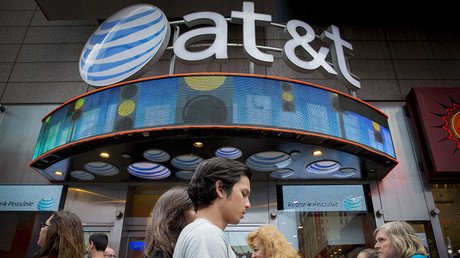‘Americans are protected from illegal search & seizure, but government ignores the Constitution’

You can’t legally tap into phones, security cameras and private cameras, as the government has apparently been doing. All of that is clearly forbidden by the Bill of Rights, Arvin Vohra, Vice Chair of the Libertarian National Committee, told RT.
The US Congress on Tuesday passed legislation allowing internet providers to sell customers' search history.
It repeals regulations created by the Obama administration, which has a mixed record on people’s privacy.
RT: If the House of Representatives and then President Trump vote to repeal the privacy regulations on internet service providers how much of a threat is that to privacy?
Arvin Vohra: I think right now the US government has made it very clear that it has no intention of following the basic requirements in the Bill of Rights, which is that all surveillance must be about a specific person, it must be permitted by a warrant, and it has to be about something specific about that specific individual. You can’t sort of warrantlessly wiretap a large number of people, as the US government has been doing. You can’t tap into phones or security cameras, or private cameras, as the government apparently has also been doing. All of that kind of stuff is clearly forbidden by the Bill of Rights. The issue that we’re seeing over the last years is that the government is ignoring that. And if the government is enabled to do that with internet service providers, my opinion is that they are going to keep on doing it and keep on infringing on personal privacy rights. I think it is absolutely vital that Americans do everything possible to protect those privacy rights.
RT: Activists claim this might be the final blow to the privacy online, but is there anything left already?
AV: I don’t think that is the final blow to privacy because the good thing is that we still have free market privacy. We have people working on all kinds of private encryption. We have tools like bitcoin and other tools that are really making it very difficult for the government to infringe on privacy. So we have a bit of a race between the private sector that is trying to increase privacy and the government, which is trying to ignore natural privacy rights. Privacy for those who think it is just about internet security; privacy is a fundamental underpinning of many legal decisions in America. One of the largest, of course, is Roe versus Wade or the right to abortion, was based on privacy rights. This is not just a thing for hackers and nerds – this is something that affects all people from all walks of life.
I do think it is important that when you see the Oversight Committee coming down on one issue and entirely ignoring another issue. What we’re seeing is incompetence at best, hypocrisy at worst. The protection of privacy must be absolute. It must extend to all forms of privacy, and it must be based on the fundamental principal that unless you have a warrant to search a specific person for a specific reason, you have no right of any kind to spy on, or wiretap and any other way to infringe on that person’s privacy rights.
#FCC blocks internet privacy regulations https://t.co/j8xqzpWbmQ
— RT America (@RT_America) March 2, 2017
RT: FBI Director James Comey made headlines recently saying there's no such thing in the US as absolute privacy. Would you agree, and should there be such a thing as absolute privacy?
AV: First of all, I think he is completely wrong. I think he is providing information that is entirely self-serving to what he just wants to do. There absolutely is a privacy right, and it is a privacy right that comes in many different parts of the Constitution, many different parts of the natural law that underlines the Constitution. What is the simplest part that I mention is that the Constitution specifically says that in order to engage in any kind of a search or seizure of any kind of property – there needs a warrant issued by a judge for the search of that individual person’s privacy. The idea of a blanket, large-scale, warrantless wiretapping is expressly and massively forbidden by the Constitution.
You can also look at the way the government treats itself. Many areas have tried to pass laws that prevent citizens from videotaping police officers. That is what I call a complete reversal. The natural rule should be that police officers can’t videotape citizens. The fact that is has gone so far indicates that the government clearly has no idea what the natural and correct way to enforce privacy rights is. The final thing that I bring up is that privacy rights, as I mentioned earlier, are rates that underline many other fundamental rights…The right to privacy is part of the Constitution, it is part of common law, and it is part of the American tradition. There is an absolute legal guarantee to privacy, which the federal government right now is ignoring, the government is violating the Constitution flagrantly and repeatedly, and that needs to stop.
The statements, views and opinions expressed in this column are solely those of the author and do not necessarily represent those of RT.













